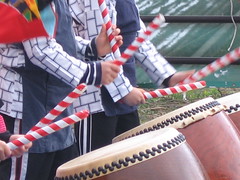I have 98 days left until my contract ends. Yikes! Quite amazing really. When I first came to Japan I thought a year was such a long time, and now here I am half way through a second year. A little crazy!
Last weekend I played taiko at the Asahi Cheery Blossom festival. It was a good little gig, although a little colder than last year's.
What always makes things more interesting is the obligatory interview with the gaijins in attendance. Usually it's John and I who get hauled back on stage to give good interview with the announcer (always a rather excitable Japanese lady with a limited grasp of English and a penchant for asking difficult and rather pointless questions).
This time however I carried out the interview with Adam - a beginner to this post-taiko ritual and therefore unaware of the joys that awaited him.
The interview started well. Both of us managed to get our names out, and both of us managed to confirm that we were in fact both teachers from Uozu and Asahi respectively. No problems there.
It was almost too easy. I was first up. The questions probed no further than 'Do you enjoy playing taiko' or 'How long have you been playing taiko'. I had it easy. Not exactly newsnight.
The announcer then approached Adam and asked (in Japanese of course) 'What do you like about taiko'.
The usual answers - 'it's fun' or 'it's interesting' don't really cut it in this instance. This is a heavy weight question and one that requires a heavy-weight answer. You have to qualify your answer with an explanation - 'It's fun because...'
Even in English this is a difficult question to ask, but in Japanese faced with a sea of obachans drinking sake, it takes on a whole new dimension.
Most souls would have blurted out something quick and easy to get the interview over. 'It's interesting'. Done. Thankyou very much, you've been a wonderful audience, goodnight.
Adam, however gave the question the time and attention it deserved, pondering for what seemed like an hour (but was probably closer to a minute). He was going to give this question the type of answer it deserved.
So what was his incisive and articulate answer? 'The backbeat, it's wicked'. In English.
The funny thing, is absolutely nobody except myself, Adam and Justice would have had any idea of what the hell he was talking about.
Acting as the translator in this situation I choose to translate the aforementioned nugget of wisdom into some semblance of Japanese. But how can you give justice to an answer like this?
After another long pause, as the announcer's face turned to confusion and panic, I gave the two-worded answer -
'oto omoshiroi' - 'interesting sound'.
It was enough. It had been understood. The silence had been broken and we were allowed to get the hell off the stage. The interview was finished.
But no doubt it won't be the last.



